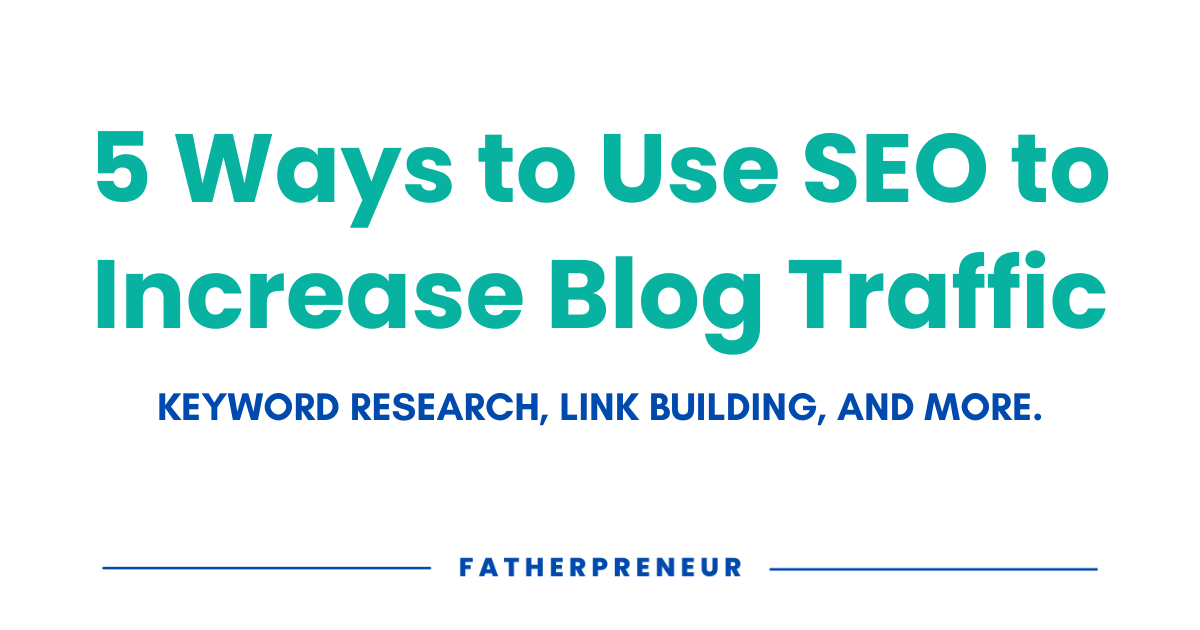This is Fatherpreneur.
The newsletter that's written by a dad with a mustache who's been creating content for 10 years.
In less than 5 minutes, you'll learn quick and actionable tips for how to create content that doesn't suck.
5 Ways to Use SEO to Increase Blog Traffic
SEO (Search Engine Optimization) is a critical component of any successful blog. SEO is essentially the process of optimizing your blog to rank higher in the search engine results pages (SERPs) so that it can be found by more potential readers. By effectively implementing SEO on your blog, you can drastically increase the amount of traffic to your blog and maximize its visibility on the web.
In this blog post, we’ll be discussing the various ways you can effectively implement SEO on your blog to drive more traffic. We’ll cover topics such as keyword research, on-page SEO, link building, and more. By the end of this post, you’ll have a better understanding of how to effectively utilize SEO to maximize the visibility and traffic to your blog. Let’s get started!
1. Keyword Research
Keyword research is one of the most important aspects of SEO. It involves researching relevant keywords and phrases related to your blog's topic that people are searching for in the search engines. Finding the right keywords to target can help you get found by more potential readers and drive more organic traffic to your blog.
When doing keyword research, it’s important to focus on both short-tail and long-tail keywords. Short-tail keywords are usually one or two words and can be very competitive. Long-tail keywords, on the other hand, are more specific and usually have less competition. When researching keywords, it’s important to focus on both short-tail and long-tail keywords to ensure that your blog is targeting relevant keywords that will help drive more traffic.
2. On-Page SEO
On-page SEO involves optimizing your blog’s content for the search engines. This includes optimizing your title tags, meta descriptions, headings, content, and other elements of your blog’s pages. It’s important to ensure that your blog’s content is optimized for the search engines so that it can be found by more potential readers.
When optimizing your blog’s content, it’s important to focus on the keywords you’ve researched and ensure that they’re included in the content. You should also ensure that your content is well-structured and easy to read so that it can be easily understood by the search engine crawlers. It’s also important to use internal links within your content so that readers can easily navigate to other related pages on your blog.
3. Link Building
Link building is another important aspect of SEO. This involves getting other websites to link back to your blog. This helps to increase the authority of your blog in the eyes of the search engines, which can lead to higher rankings and more organic traffic.
When building links to your blog, it’s important to focus on high-quality links from reputable websites. You should also focus on building links from websites that are related to your blog’s topic. It’s also important to diversify your link building efforts and focus on both do follow and nofollow links.
4. Technical SEO
Technical SEO involves optimizing the technical elements of your blog such as the HTML code, site speed, and more. It’s important to ensure that your blog is optimized for the search engines so that it can be easily found by potential readers.
When optimizing your blog’s technical elements, it’s important to make sure that your blog is using the latest version of HTML and that all the code is valid and error-free. It’s also important to ensure that your blog is optimized for mobile devices, as mobile search is becoming increasingly important. Additionally, you should make sure that your blog loads quickly so that visitors don’t get frustrated and leave.
You can publish a newsletter and responsive blog in one-click with beehiiv.
5. Content Marketing
Content marketing is another important aspect of SEO. This involves creating high-quality content that is relevant to your blog’s topic and that resonates with your readers. Content marketing can help to drive more organic traffic to your blog as well as build relationships with potential readers.
When it comes to content marketing, it’s important to focus on creating content that is both informative and engaging. You should also consider leveraging social media to promote your content and engage with potential readers. Additionally, you should focus on leveraging SEO best practices to ensure that your content is optimized for the search engines.
By following these tips, you can effectively implement SEO on your blog and drive more organic traffic. SEO is an ongoing process, so it’s important to stay up-to-date with the latest trends and continue to optimize your blog for the search engines. With the right SEO strategy in place, you can drastically increase the visibility and traffic to your blog.
Oh, and by the way, artificial intelligence wrote this blog.
